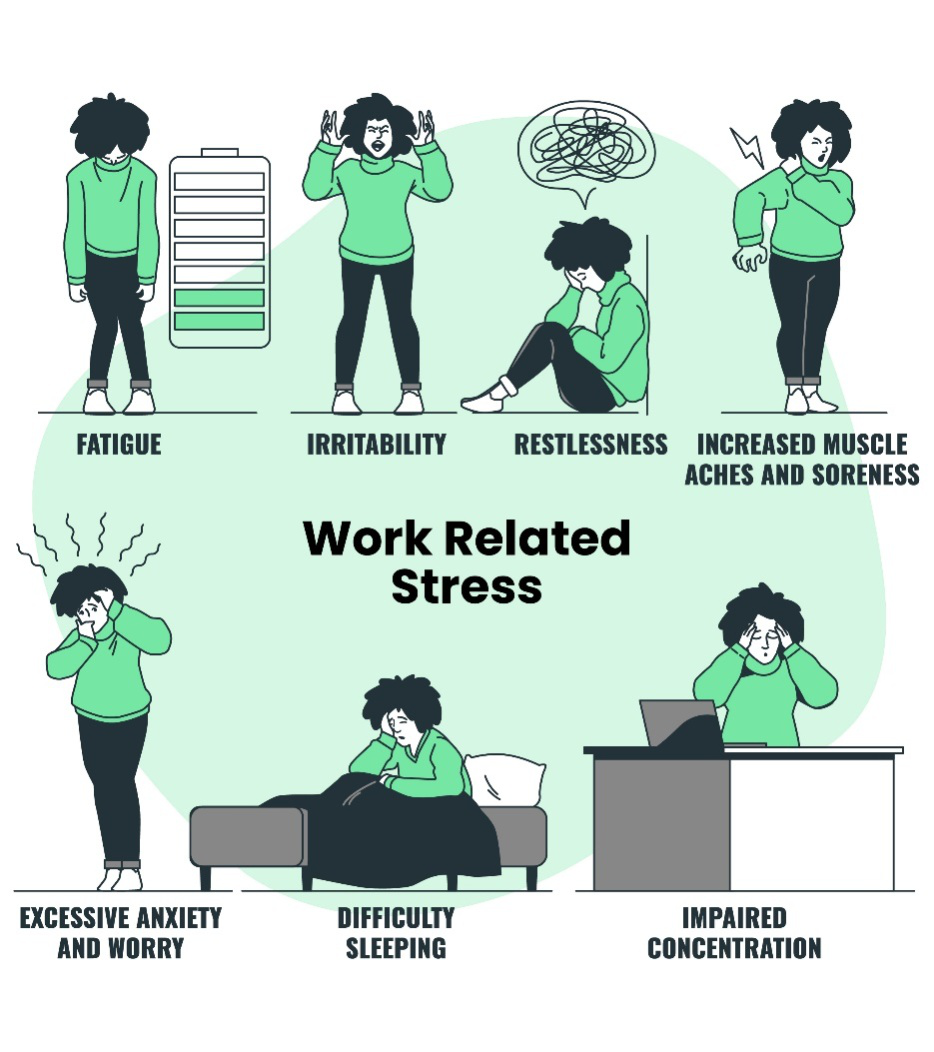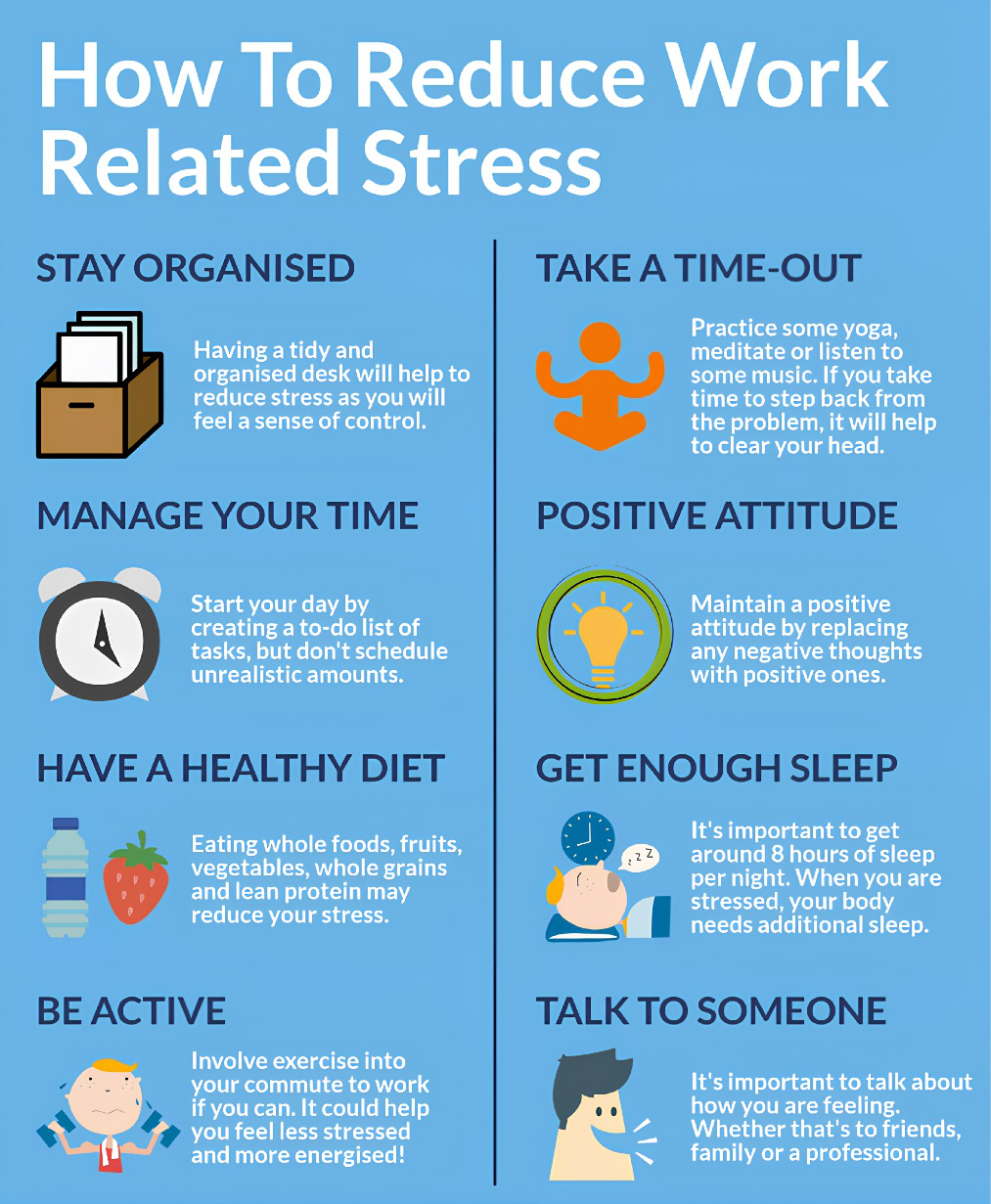The modern workplace is a demanding environment. Deadlines loom, workloads can be significant, and the pressure to perform consistently can be high. While some level of challenge is healthy and motivating, chronic work-related stress can significantly impact our mental and physical well-being.
This blog serves as a valuable resource for professionals, guiding them on how to manage their mental health in the workplace. Let’s begin!
10 Signs You’re Stressed About Work
Work-related stress can manifest in various ways, affecting both our physical and mental health. Recognizing these signs early on is crucial for addressing the issue and preventing further escalation. Here are ten common signs that indicate you may be experiencing stress related to your work:
- Persistent Fatigue:Feeling constantly tired or lacking energydespite getting enough sleep could be a sign of excessive stress. Stress can disrupt sleep patterns, leading to insomnia or restless nights. Even after a full night’s rest, individuals may wake up feeling exhausted, making it challenging to face the demands of the day.
- Irritability and Mood Swings:If you find yourself becoming easily agitated, snapping at colleagues or loved ones, or experiencing sudden mood swings, it could be a result of stress at work. Stress can exacerbate emotional responses and make it challenging to regulate your mood. Small frustrations or inconveniences that wouldn’t typically bother you may provoke an outsized reaction when under stress.
- Physical Symptoms:Stress often manifests physically, leading to a variety of symptoms that can impact overall well-being. These symptoms may include headaches, muscle tension, gastrointestinal issues (such as stomachaches or nausea), and even chest pain. Individuals may also experience a weakened immune system, leading to frequent illnesses or infections.
- Difficulty Concentrating:Stress can impair cognitive function, making it difficult to concentrate, remember details, or make decisions. Individuals may find themselves feeling overwhelmed by tasks that were previously manageable, leading to decreased productivity. This difficulty focusing can further exacerbate stress levels, creating a cycle of frustration and anxiety.
- Changes in Appetite:Stress can disrupt eating habits, leading to either increased or decreased appetite. Some individuals may turn to food for comfort, leading to overeating or unhealthy eating habits. Conversely, others may experience a loss of appetite due to heightened anxiety, leading to unintended weight loss and nutritional deficiencies.
- Social Withdrawal:Feeling overwhelmed by work-related stress may cause individuals to withdraw from social interactions or hobbies that they once enjoyed. They may isolate themselves from friends and family, preferring to spend their free time alone. This social withdrawal can further exacerbate feelings of loneliness and isolation, contributing to a decline in mental health.
- Increased Absenteeism:Chronic stress can lead to frequent absenteeism from work due to physical or mental health issues. Individuals may find themselves calling in sick more often or experiencing unexplained absences. This increased absenteeism not only impacts their own productivity and job performance but can also create additional stress due to feelings of guilt or inadequacy.
- Negative Self-Talk:Stress can fuel negative self-talk and feelings of inadequacy. Individuals may find themselves doubting their abilities, experiencing imposter syndrome, or constantly criticizing their performance at work. This negative self-talk can erode self-confidence and self-esteem, leading to further stress and anxiety about their job performance.
- Procrastination:Stress can lead to procrastination, as individuals may feel overwhelmed by the tasks at hand and unsure of where to start. They may delay completing assignments or projects, hoping to avoid the stress and anxiety associated with them. However, this procrastination only serves to increase stress levels in the long run as deadlines loom and tasks pile up.
- Escapist Behaviors:In an effort to cope with work-related stress, individuals may engage in escapist behaviors such as excessive drinking, drug use, or compulsive spending. These behaviors provide temporary relief from stress but can ultimately exacerbate the problem and lead to additional issues, such as addiction or financial strain.
By recognizing these signs of work-related stress, you can take proactive steps to address the underlying issues and prioritize their mental health and well-being. It’s essential to seek support from trusted colleagues, friends, or mental health professionals if you’re struggling with work-related stress. Remember, you’re not alone, and there are resources available to help you navigate through difficult times.
Managing Your Mental Health at the Workplace
Addressing work-related stress requires a multifaceted approach that encompasses both individual coping strategies and organizational support systems. Here are several effective strategies for managing your mental health in the workplace:
- Establish Boundaries:By defining specific working hours and sticking to them, you create space for relaxation and leisure activities outside of work. Additionally, designate time for breaks throughout the day to rest and recharge. Avoiding the urge to check work emails or messages during non-work hours helps preserve a balance and allows for uninterrupted downtime, ultimately reducing stress and promoting overall happiness and productivity.
- Practice Stress Management Techniques:Incorporating stress-reducing activities into your daily routine is essential for managing work-related stress effectively. Engaging in mindfulness meditation, deep breathing exercises, or yoga can help alleviate tension and promote relaxation. These practices not only provide immediate relief from stress but also enhance resilience and coping skills over time. By making stress management a priority and integrating these techniques into your daily life, you empower yourself to navigate challenging situations with greater ease and maintain a positive mindset amidst workplace pressures.
- Prioritize Self-Care:Making self-care a priority is essential for maintaining mental well-being in the workplace. This involves engaging in activities that nurture your mind, body, and soul on a regular basis. Whether it’s exercising regularly, spending time outdoors, pursuing hobbies, or connecting with loved ones, self-care practices help replenish your energy reserves and reduce stress levels. By carving out time for self-care activities amidst your busy schedule, you reinforce your resilience and enhance your ability to cope with workplace challenges effectively, ultimately promoting greater overall satisfaction and fulfillment in both your personal and professional life.
- Seek Social Support:Building a strong support network is crucial for managing work-related stress and maintaining mental health. Speak to friends, colleagues, or family whom you trust and feel comfortable confiding in. Sharing your thoughts and feelings with others can provide emotional validation and perspective, helping alleviate feelings of isolation and loneliness. Additionally, consider joining professional support groups or seeking guidance from a therapist or counselor if you need more specialized assistance. By fostering meaningful connections and seeking support from others, you strengthen your resilience and create a supportive environment in which you can navigate workplace challenges more effectively.
- Communicate with Your Supervisor: Open communication with your line manager or supervisor is key to addressing work-related stress and promoting a healthy work environment. If you’re feeling overwhelmed or experiencing challenges at work, don’t hesitate to schedule a meeting with your supervisor to discuss your concerns. Be honest and transparent about your feelings, and work together to identify potential solutions or accommodations that can help alleviate stress and improve your well-being. Whether it’s adjusting workload expectations, revising deadlines, or implementing flexible work arrangements, effective communication with your supervisor can lead to positive changes that support your mental health and overall job satisfaction.
- Engage in Professional Development:Investing in your professional growth and skill development can have a positive impact on your mental health and job satisfaction. Continuously seeking opportunities to learn and grow in your role not only adds to your expertise and confidence but also fosters fulfillment in your work. Whether it’s attending workshops, pursuing additional certifications, or participating in mentoring programs, engaging in professional development activities helps you stay motivated and inspired, even in the face of challenges. By proactively investing in your career growth, you cultivate resilience and adaptability, positioning yourself for long-term success and satisfaction in your professional journey.
Join Metro Safety’s Courses for Improving Mental Health at the Workplace!
Take proactive steps to enhance your mental health at the workplace by enrolling in Metro Safety’s courses. Our comprehensive training programs provide valuable insights and practical tools for managing work-related stress, promoting well-being, and fostering a positive workplace culture. From stress management techniques to communication skills and conflict resolution strategies, our courses are designed to empower professionals to thrive in high-pressure environments.
Some of our courses are also tailored to different roles and workplaces, i.e., confined space safety, fall protection, and fall arrest, occupational first aid (Levels 1, 2, and 3), including others. Moreover, our emergency and standard first aid courses are vetted by the Canadian Red Cross, so you can rest assured knowing that you’re learning from the best in British Columbia.
Invest in your mental health today and join Metro Safety’s courses for a happier, healthier, and more fulfilling work experience. Visit our website to learn more, and sign up now!











